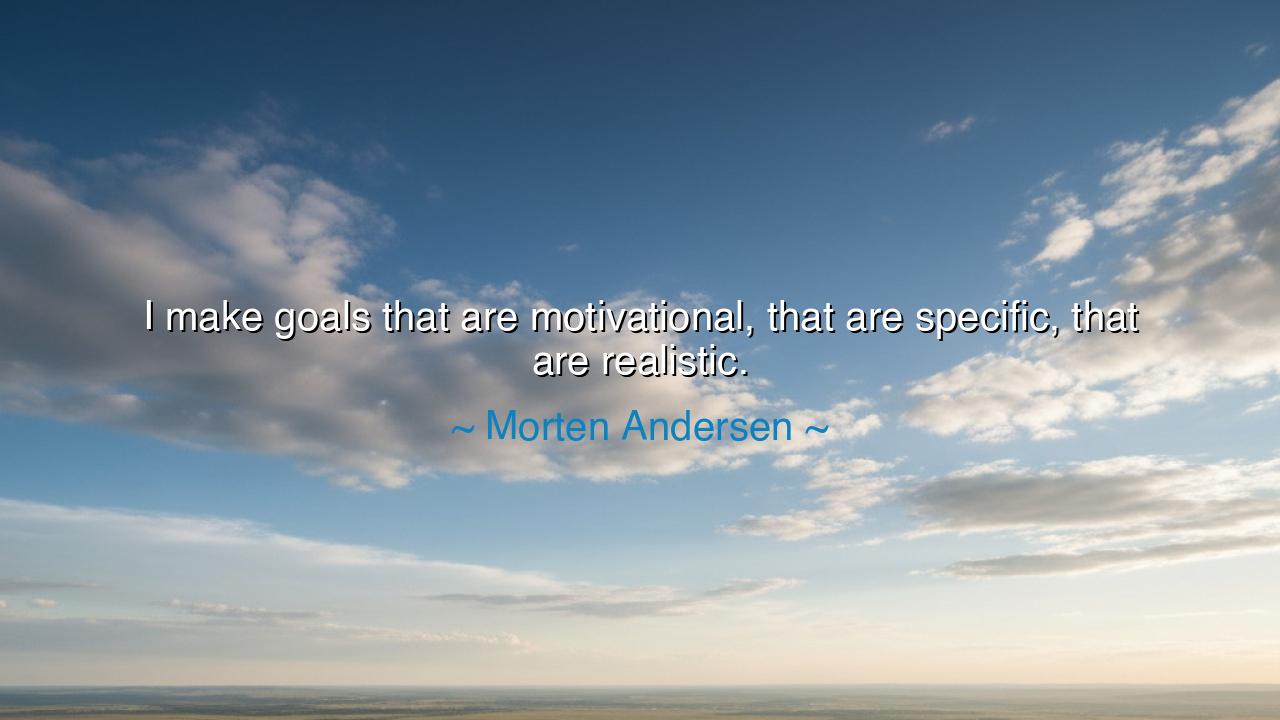
I make goals that are motivational, that are specific, that are






In the words of Morten Andersen, the great kicker whose career stretched across decades in the fierce arena of American football, we find a declaration of eternal wisdom: “I make goals that are motivational, that are specific, that are realistic.” These words, though spoken in the language of sport, resound in every field of human striving. For man is a creature of desire, forever setting his eyes upon horizons yet unreached. But to walk toward them with strength, the goals we set must be forged with care—clear enough to guide, inspiring enough to lift the spirit, and achievable enough to keep the heart from despair.
When Andersen speaks of motivational goals, he calls forth the fire that dwells within every human breast. A goal must stir the heart, must make the pulse quicken, must summon a man from idleness into movement. Without this spark, the goal becomes a lifeless burden, carried not with joy but with resentment. The ancients would say: a man without desire is like a ship without wind—he drifts but never sails. Thus, a motivational goal is one that awakens within us the will to rise, to endure, to dare.
But passion alone is not enough. Andersen adds that a goal must be specific. For who can strike a target that he does not see? To say, “I will be better,” is a mist; to say, “I will run one mile faster,” is a flame. In specificity, the dream takes form, and the mind, once wandering, becomes a blade sharpened to a point. So it is that soldiers mark the ground before battle, and builders draft their plans before stone is laid. Without clarity, desire is scattered; with it, desire becomes destiny.
And yet even passion and clarity may betray us if the goal is beyond reach. Therefore Andersen, with wisdom earned through years of discipline, speaks also of realistic goals. To reach too far too soon is to risk the crushing of the spirit. A youth who dreams of climbing mountains must first train on the hills. The ancients taught that the oak grows not in a day, but through seasons of steady strengthening. Realism does not quench ambition; it nurtures it, step by step, until the impossible of yesterday becomes the triumph of tomorrow.
Consider the story of Hannibal of Carthage, who dreamed of conquering mighty Rome. His goal was vast, and his ambition burned hot. Yet he did not rush blindly; he set forth with a plan, leading his men and elephants across the Alps, one treacherous pass at a time. He did not try to swallow Rome in one strike, but struck piece by piece, victory by victory, his campaign etched into history. Though fate denied him ultimate conquest, his name endures as a symbol of relentless clarity, strategy, and discipline. His goals were motivational, specific, and indeed, realistic for the man he was and the age he lived in.
The meaning of Andersen’s words, then, is not confined to the stadium. They are a map for all who seek greatness. In every life, there must be goals: goals that ignite the heart, that direct the mind, and that respect the truth of where we stand today. To neglect one of these is to falter. A goal without motivation grows cold. A goal without specificity wanders. A goal without realism collapses. But a goal forged with all three shines like a star, guiding us steadily forward.
So let the teaching be this: when you set your goals, test them against these three fires. Ask: Does this goal move my spirit? Is it clear in my vision? Is it possible with the strength I now possess? If so, then walk toward it without hesitation. Begin with the small, build toward the great, and let each victory feed the next. For as Andersen’s long career proves, the man who sets goals wisely will stand unshaken through the storms of time, his legacy carved not by chance but by the steady hand of purpose.






AAdministratorAdministrator
Welcome, honored guests. Please leave a comment, we will respond soon